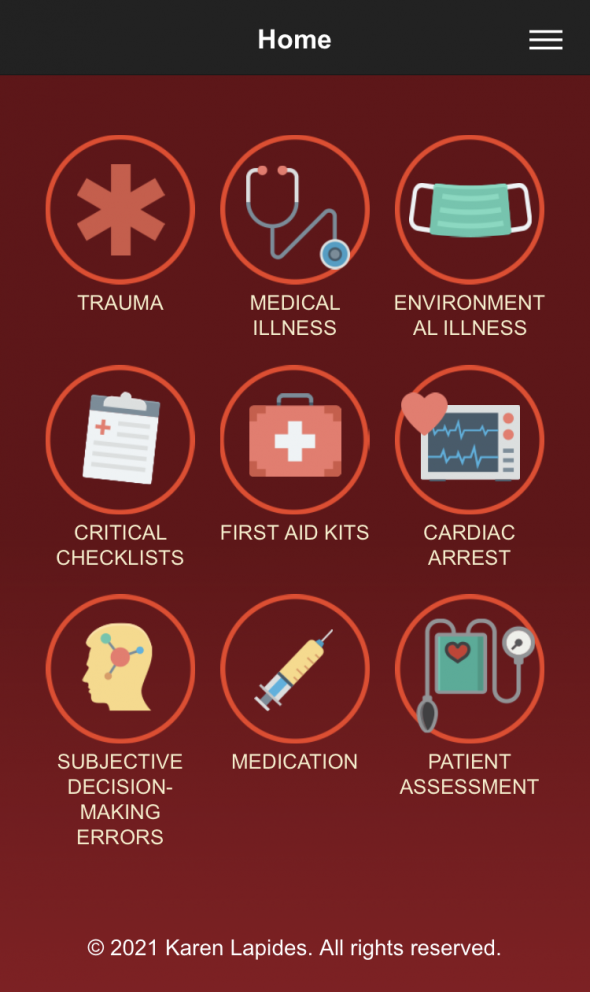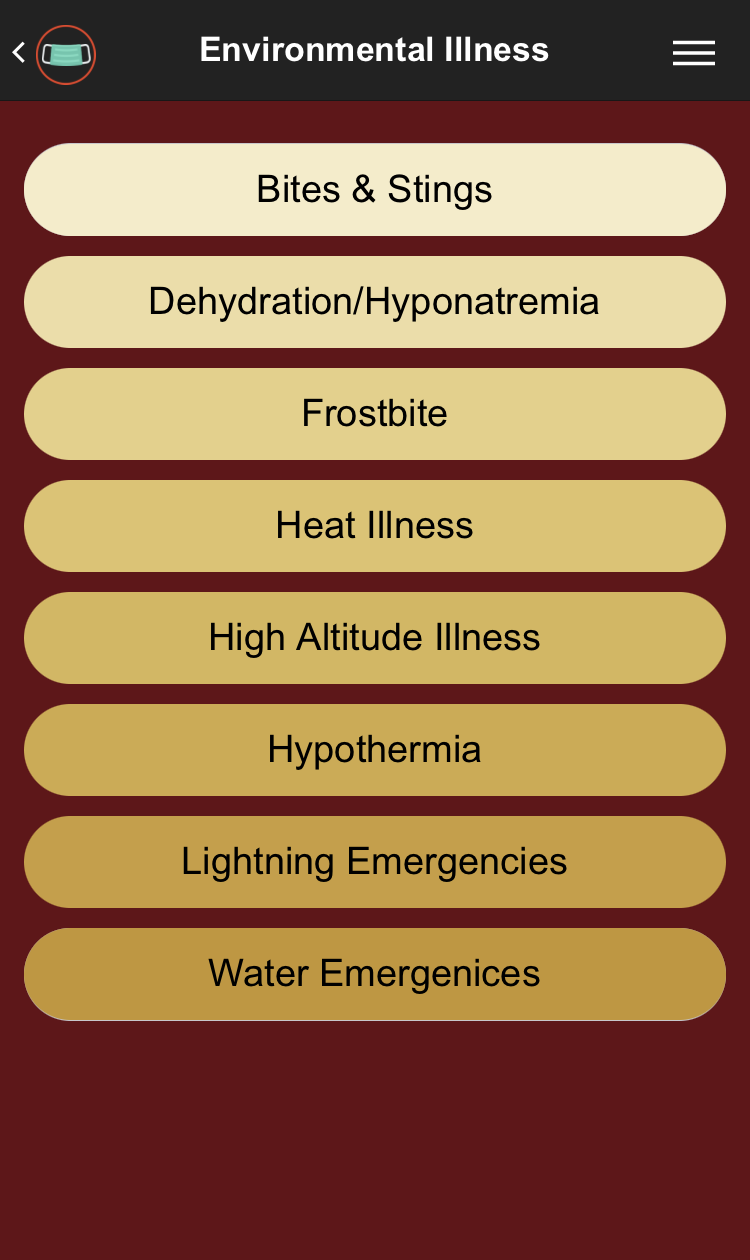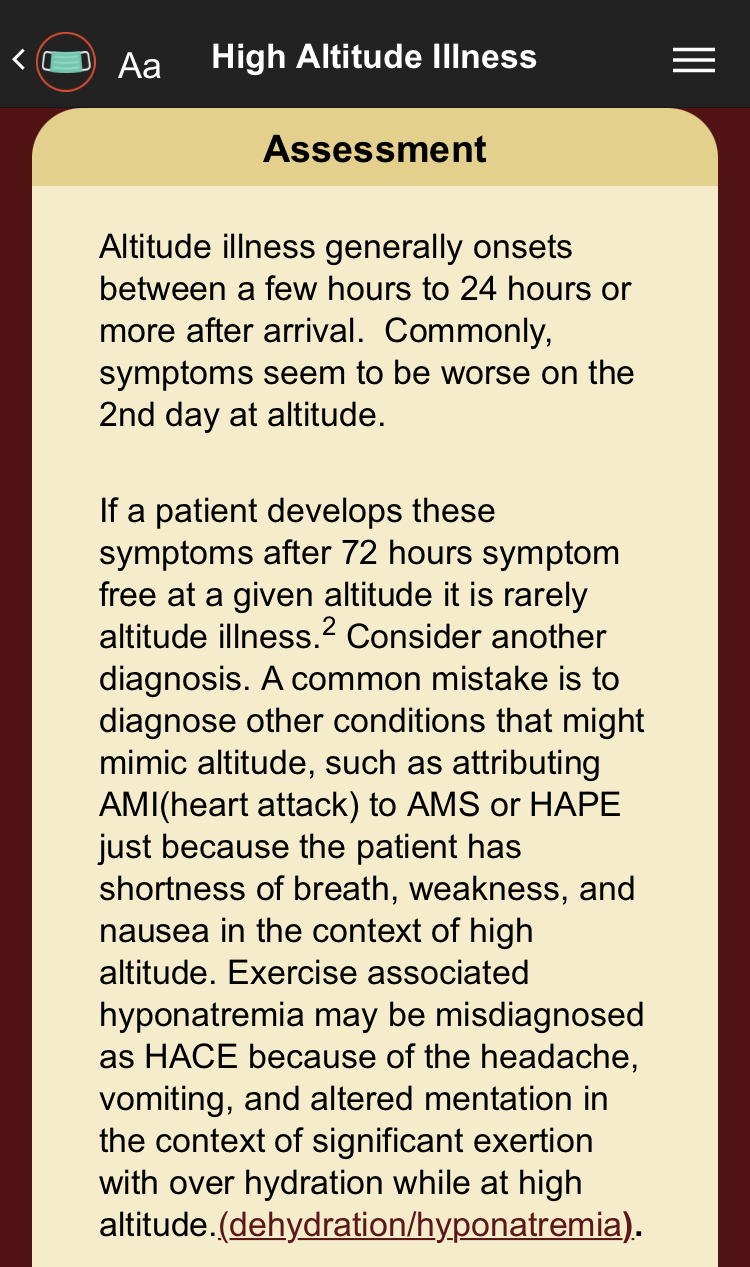
The Wilderness Medicine Reference Application homepage. Your starting point for accessing info on the app.
The backstory of writing “Thin Margins in the Sliver,” went something like this: Me asking a question, with the two skiers directly involved with the incident answering in detail, and then a long silence—just a few moments to reflect on what could have been and wasn’t.
The skiers drew a lucky hand in a scenario where a few centimeters either way could have played out with a grim conclusion. On the audio recording, I repeat several times throughout the 45-minute interview, “I’m glad I’m not writing a different kind of story.”
There are occasions when emergency preparedness can tip the scales of luck a bit more in your favor. There are timeworn ways to do this: find great mentors, seek expertise, take classes, things like pursuing a Wilderness First Responder, which is no small investment in money and time.
Recently, I became aware of an app that tips those scales of luck in your favor when it hits the fan. Wilderness Medicine Reference is a phone-based app organized to assist you when backcountry medical assistance, know-how, or just some basic information to calm a harried situation down is required.

Tapping on the links for “Environmental Illness” brings the user to this menu.
Atop the app’s main menu are icons for “Trauma,” “Medical Illness,” and “Environmental Illness.” That is, literally, the tip of the iceberg of the information at your fingertips. These three topics are the gateway to preventing some medical/health situations from escalating and recognizing early warning signs way before the SOS button is triggered.
For example, you suspect a partner suffers from altitude sickness. Let’s hope and assume you are familiar with the telltale warning signs. But, you’re looking for a refresher or confirmation to confirm or deny: click “Environmental Illness,” then “High Altitude Illness,” and tabs appear for “Background,” “Assessment,” “Treatment,” and “Prevention.”
This app is intuitive and systems-based. Once familiar with the app’s layout, it’s easy to scroll through to the relevant and specific medical information you’re seeking. Like any good medical resource, the app includes checklists, case studies, info on pain mitigation, subjective decision-making errors, patient assessment, resources, and references. It also provides excellent information on building out first aid kits and how to modify them for winter emergencies. This app is also a tool for those instances when all you have to worry about are low-angle powder runs and fist bumps. During downtime, just reading through the case studies, or any of the information on the app for that matter, reinforces the emergency scenario basics.

A screen shot, of the top of a page, describing how to assess someone suspected of having altitude sickness.
Don’t expect a wilderness medical textbook tome, but for an in-the-field substitute, the app is golden. The brainchild behind the app is Karen Lapides, a well-versed backcountry instructor who has worked for NOLS, Outward Bound, and is a trained paramedic.
Most of us are not on expeditions employing medical personnel – and even a chill backcountry day can go awry quickly. This digital gem may stack the odds in your favor with an eye towards lightweight – as in you’re not likely to carry that wilderness medical emergency book mentioned above. However, you can, for 99 cents, spot yourself an app that may come in handy.
The Wilderness Medicine Reference is a great tool. And because this is what we do here, remember, the app is no substitute for deep learning, training, practice, and experience. But for the price of that shot of Vanilla in a Latte, the benefits far exceed the costs.
You can find the app on the Apple app store or Google Play. The app’s homepage is linked here.
Price: $00.99 (I love typing that.)
Jason Albert comes to WildSnow from Bend, Oregon. After growing up on the East Coast, he migrated from Montana to Colorado and settled in Oregon. Simple pleasures are quiet and long days touring. His gray hair might stem from his first Grand Traverse in 2000 when rented leather boots and 210cm skis were not the speed weapons he had hoped for. Jason survived the transition from free-heel kool-aid drinker to faster and lighter (think AT), and safer, are better.
